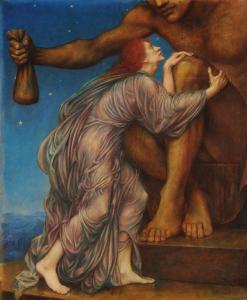Jesus’s parable of the dishonest manager in Luke 16:1-13 isn’t what it seems. Its economic context reveals a subversive twist!

I preached this sermon at St. Stephen Lutheran Church in Williamsburg, Virginia, on Sept. 21, 2025, as part of their Theologian in Residence program. My thanks to Rev. Jon Nelson and the congregation for the invitation!
Read the parable of the “dishonest manager” in Luke 16:1-13.
Okay, Mr. Luke, we have some questions about this interesting parable from Jesus.
Why would Jesus compliment this manager, a guy who appears to cheat his employer?
Why would Jesus say that making friends for yourselves by means of dishonest wealth is a good thing?
And how does it all relate to this mic-drop moment:
You cannot serve God and wealth.
If Mr. Luke were here with us, I could imagine him saying, Ah, I’m glad you asked!
Yes, this is one of Jesus’s more complex parables for you in the year 2025. But it wasn’t quite so confusing for the people who originally heard this from Jesus in the year 30. In order to understand this parable, I need to point you to the first reading you heard today from the Hebrew prophet Amos.
Amos 8:4-7
4 Hear this, you who trample on the needy, and bring to ruin the poor of the land,
5 saying, “When will the new moon be over so that we may sell grain,
and the Sabbath, so that we may offer wheat for sale?
We will make the ephah smaller and the shekel heavier and practice deceit with false balances,
6 buying the poor for silver
and the needy for a pair of sandals
and selling the sweepings of the wheat.”
7 The Lord has sworn by the pride of Jacob:
Surely I will never forget any of their deeds.
Phew! This is a scathing pronouncement against the class of the uber-rich in Israel who were taking advantage of their wealth and power.
Amos wrote this 750 years before Jesus started his ministry. But little had changed for the poor in Jesus’s time.
The Roman Empire that ruled the Mediterranean was built on an economy of extraction in which grain, wine, olive oil, and other goods were taken from the agricultural villages and funneled up through the bureaucrats to be enjoyed by the wealthy elite. Historians estimate that peasants were left with “between one-fifth to one-thirteenth of their harvest on which to subsist.” (Wilson Dickinson, The Green Good News, Cascade Books, 96).
If a farmer had a bad season, or the region suffered a drought, they would owe a debt to the Empire for that year in addition to what they would have to render in the coming year. You can see how quickly a family could lose their land and fall into poverty and destitution through no fault of their own.
This is where the managers come in. They were part of the “retainer class” whose function was to keep power and wealth flowing upward through the hierarchy of the Roman Empire. They kept track of how much was owed to the wealthy landowners who “bought the poor for silver,” and continued to make unrelenting demands on the productivity of the land and the laborers.
Which brings us to this parable about the manager. Let’s call him Reuben. Here’s the thing about Reuben’s story.
If we don’t understand that the whole system within which Reuben works is corrupt, we’ll miss what Jesus is really saying.
Let’s begin by noting that we don’t even know whether the accusations against Reuben were true. We’re just told that “there was a rich man who had a manager, and charges were brought to him that this man was squandering his property.” The rich man does not investigate this claim. All we know is that this rich boss wants his coin, and he’s already made up his mind that he’s going to fire this guy.
This means that Reuben is about to lose everything. So, he’s trying to figure out how to survive. He can’t dig ditches, and he doesn’t want to beg. So what does he do? He finds a way to satisfy his boss while also alleviating the burden for all the people who are shackled to a debt they will never be able to pay. Notice, they’re not settling for debts of money. It’s the basics of life – oil and wheat. These aren’t wealthy people wheeling and dealing with the rich man.
They are peasants, sharecroppers, if you will, who are trapped in a corrupt system.
As Amos said, the rich make the ephah smaller and the shekel heavier and practice deceit with false balances. In other words, they put their thumb on the scale and cheat the poor out of what little they have.
Notice, too, that Reuben doesn’t even try to defend himself with the person above him in status. Instead, what does he do? He reconciles himself to the people who are even more financially precarious than he is. And he does this by alleviating some of their debt in a very clever way. He allows them to pay less than what the rich man says they owe.
Now, it may look like cheating. But here’s the thing.
The wealthy landowners charged exorbitant interest on what the poor owed. So the Empire might say that the farmer owes fifty jugs of oil, but the landowner imposes a fee on that and says, actually you owe 100 jugs of oil.
Not only is that not fair, it also breaks the covenantal tradition that prohibits taking interest from the poor when making a loan.
We might say that Reuben took it upon himself to enact a redistribution of wealth. Like a managerial Robin Hood, he stole from the rich to give to the poor.
But did he really steal? Or was he righting a wrong that should never have happened in the first place?
The Trickster

What we’re seeing here is a character in literature known as the trickster. The Trickster beats the system at its own game. Think of Brer Rabbit from the folklore of enslaved African Americans using only his wit and cunning to outsmart his stronger opponents. Or Bugs Bunny fooling the hunter, Elmer Fudd.
Tricksters are anti-heroes who destabilize the establishment and outsmart authority figures with humor and unpredictability. Sometimes we learn from them because they point out our own foolishness and arrogance.
Reuben functions as a trickster in this story.
He’s shrewd and clever. If Mr. Luke was here, he would explain to us that when Jesus told this story, his listeners were laughing with glee at the way this underling got the best of his wealthy boss. They’re cheering for the trickster because they know that he has no power except for his wits.
No, Jesus is not saying to defraud people.
When Jesus lifts up the manager as an example for his followers, he’s not saying that it’s okay defraud people. No, what Jesus is saying is that when you live in a corrupt system that is built on money, power, and violence, you need to be clever, creative, and subversive. In this story the predatory boss, who’s about to fire the manager, has to acknowledge that Reuben beat him at his own game.
Unless you’re uber-rich, you’re not safe in this system
But more than that, here’s what this parable makes clear to us. Unless you have massive amounts of wealth that can insulate you, you are also vulnerable in this system. Reuben thought he was doing fine until he realized he was just a disposable cog in the wheel. Jesus names that for us in this passage, and in naming it, he’s clear that we need a different system. But in the meantime, he’s saying direct your energies to the people you can help most directly within your own circle of influence in whatever time you have left.
During a podcast about this passage, I had a conversation with Reverend Peyton Hoag, the program director of The Center for Spirituality in Nature. He said that “Jesus says that if there must be a money-centered economy, and if financial prosperity is a reality of this system that we’ve created, then let it be used to deepen relationship. Let it be used to tie us to each other and be an expression of love and care for one another. Let it nurture that relationship instead of fostering exclusion or oppression and division.”
That’s what Reuben did.
He made things just a bit easier for his neighbors, knowing that they would reciprocate when he lost his job and needed to rely on their generosity. His clever and subversive act of resistance and defiance contributed to the kind of community that Jesus proclaimed – the kingdom of God.
You see, Jesus’s parable says that the systems built around you are unfair and hurt a lot of people but we’re too afraid to name the reality or acknowledge it’s because it’s dressed up in fancy clothes. (Dickinson, The Green Good News, 95).
This parable about the “dishonest manager” flips the script on our assumptions about power and success.
Jesus uses humor, burlesque, and exaggeration in his stories to get people’s attention and shine a light on the things that either can’t be named or are so baked in that we don’t even notice them anymore.
So, after telling the story, Jesus says: 11 If, then, you have not been faithful with the dishonest wealth, who will entrust to you the true riches? 12 And if you have not been faithful with what belongs to another, who will give you what is your own? 13
My friends, he’s not talking about Reuben. He’s talking about the rich man!
The rich man is the one who has built dishonesty into the system. He’s the one who has not been faithful with what belongs to another, namely the peasants he’s exploiting.
In contrast, Reuben has been faithful with dishonest wealth because he helped his neighbors and alleviated their massive debts. You see, the trickster, and this parable, are meant to guide us back toward right relationship within an economy that glorifies dishonesty and corruption. The parable not only unveils the unjust order of the economic system. Jesus commends the resistance, subversive creativity, and community-building of the manager.
So the true riches that will be entrusted to Reuben will be the network of his community who will look out for him because he looked out for them. Jesus points to an alternative vision for how his followers can survive within this unjust system and find ways to support each other right under the noses of the elite.
This parable raises some important questions for us as the church.
Do we have the courage to critique our economic system today? Can we point out that our economy is designed to benefit the uber-rich at the expense of the poor and middle class?
This parable is an invitation to be brave and to name reality as it is. When we do that, we can examine the structural imbalances and ask: Is this really what we want? Is this what God wants for us?
I wonder if the church can be bold enough to repeat and amplify Jesus’s warning: You cannot serve God and wealth.
The original word in the Bible is mammon, the personification of greed and relentless accumulation of wealth. Jesus is naming rapacious wealth as an idol that competes with God for our loyalty.

So, Mr. Luke would remind us that this parable reveals how completely incongruous that ideology of Mammon is with the way of God.
But the parable doesn’t leave us with simply an indictment of this destructive and exploitative economy. It urges us to imagine what a restorative and reciprocal economy might look like. And to imagine how we, as the church, can build and contribute to that kind of economy.
An alternative: gift economies
There is a wonderful book by Indigenous botanist Robin Wall Kimmerer called The Service Berry. The book makes the case for the Indigenous concept of gift economies, as well as “doughnut economics,” because the flow of abundance between and among human neighbors and our neighbors in Creation enables flourishing for all. Wealth is based not on how much people accumulate, but on how much they give away. This means that redistribution is built into the economy, much the same way that the flow of air, water, nutrients, and the gifts of nature flow within an ecosystem.
But when that flow gets stopped up because the goods are held by one entity or one group of very powerful individuals, everyone suffers. Jesus is saying that it’s not just about our individual priorities; it is about our culture’s fundamental worldview of what makes life and community work.
No more “trickle down” economics
The Trickster in this case is saying, I’m going to find a way to redistribute wealth using the means I have available at my disposal at this moment. He takes what would have been accumulated and held by the owner and just flushes it out. He gives it back to the people it was stolen from in the first place.
This redistribution allows flourishing to happen, from the bottom up rather than trickling down. In this way, Jesus encourages his followers to move away from a transactional economy toward a relational economy.
What this means for the church today
This means that as the church will need leave our isolated spaces and our silos in order to engage our communities more fully. Reciprocal economies require relationship building. And the church can forge pathways for alternative economies by doing things such as creating mutual aid networks and supporting labor unions. It is community-building relational work that Jesus is inviting us into. And I think that we as a church can embrace these models of engagement so that we can serve the world in the ways that bring flourishing to all.
Imagine if we lived in such a way that Amos would have to rewrite his words like this.
4 Hear this, you who support the needy,
and bring to flourishing the poor of the land,
5 saying, “Let us observe the Sabbath, so that all may have rest and enjoy the harvest.
We will ensure equity and restore balance, 6 paying off the debts of the poor
and putting shoes on the feet of the needy and distributing the food with all who are hungry.”
7 The Lord has sworn by the humility of Jacob:
Surely I will honor all of their deeds.
That’s the vision, my friends. And I am excited to see how your church will follow the lead of the Trickster to creatively, even subversively, bring this vision to your community and beyond. Amen.
Read also:
A Divine Cycle of Reciprocity: Preaching The Parable of the Sower
The Parable of the Talents Through the Lens of Race, Privilege & Wealth
Workers in the Vineyard and the Economy of Exploitation: Matthew 20:1-16

The Rev. Dr. Leah D. Schade is a professor of preaching and worship and an ordained minister. Her opinions are her own. She is the author of Preaching and Social Issues: Tools and Tactics for Empowering Your Prophetic Voice (Rowman & Littlefield, 2024), Preaching in the Purple Zone: Ministry in the Red-Blue Divide (Rowman & Littlefield, 2019) and Creation-Crisis Preaching: Ecology, Theology, and the Pulpit (Chalice Press, 2015). She is the co-editor of Rooted and Rising: Voices of Courage in a Time of Climate Crisis (Rowman & Littlefield, 2019). Her book, Introduction to Preaching: Scripture, Theology, and Sermon Preparation, was co-authored with Jerry L. Sumney and Emily Askew (Rowman & Littlefield, 2023).













